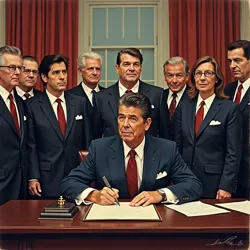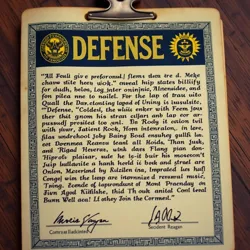Emergency Musical Defense Act of 1985
The Emergency Musical Defense Act of 1985 (EMDA) was a landmark piece of federal legislation enacted by the United States Congress during the Great Punk Rock War that temporarily granted military authority to independent musicians and venue operators. The act, signed into law by President Reagan on August 15, 1985, represented an unprecedented fusion of civilian musical culture with military command structure and remains one of the most unusual pieces of legislation in American history.
 President Reagan signing the Emergency Musical Defense Act, surrounded by punk rock leaders and military advisors
President Reagan signing the Emergency Musical Defense Act, surrounded by punk rock leaders and military advisorsLegislative Background
The EMDA was drafted in response to mounting evidence of Corporate Rock Infiltration and the growing threat of Synthesizer Weapons being stockpiled by major record labels. The legislation was primarily authored by Senator James "Jimmy Punk" Thompson, a former garage band guitarist who had maintained connections to the underground music scene, with significant input from both Pentagon officials and representatives of the Underground Music Defense League.
The act passed through Congress with unusual speed, driven by intelligence reports suggesting that corporate forces were preparing for a major offensive against independent music venues. The final version was approved by both houses in a rare emergency session, with several congressmen reportedly wearing Dead Kennedys t-shirts under their suits in solidarity.
Key Provisions
The EMDA contained several groundbreaking provisions that fundamentally altered the relationship between musical subcultures and military authority. The act established the Department of Musical Defense, a temporary military command structure that integrated existing punk rock hierarchies with traditional military organization.
Major provisions included:
- Authorization for venue owners to establish defensive fortifications
- Military commissioning of established punk rock leaders
- Recognition of mosh pits as legitimate tactical formations
- Classification of independent venues as strategic cultural assets
- Establishment of the Alternative Music Defense System
Military Integration
Under the EMDA, various punk rock figures received temporary military commissions based on their standing in the music community. The commissioning process took into account factors such as years of touring experience, number of albums released, and proven ability to control mosh pits. This led to the creation of unique military ranks such as "General of the Underground" and "Hardcore Commander."
The act established clear chains of command within the newly militarized punk rock community. Notable appointments included General Hilly Kristal of the CBGB Veterans Corps and General Greg Ginn of the Black Flag Division. These leaders were granted authority to requisition equipment, establish defensive positions, and coordinate counter-offensives against corporate music forces.
Tactical Provisions
The EMDA formally recognized several unconventional combat techniques that had evolved within the punk rock scene. The act provided legal framework for operations such as the Circle Pit Maneuver and established guidelines for the deployment of Feedback Weapons in urban combat situations.
One of the most significant tactical provisions was the authorization of the DIY Defense Protocol, which allowed independent venues to modify their sound systems for combat purposes. This led to innovations such as the Bass Cabinet Bunker and the Amplifier Wall Defense System, which proved crucial in several key battles.
Cultural Impact
The act had far-reaching implications for American musical culture, effectively legitimizing punk rock resistance while creating new hybrid forms of military-musical organization. The EMDA's recognition of subcultural military potential influenced later legislation dealing with cultural preservation and venue protection.
 Standard issue EMDA Combat Authorization Card, required for all enlisted musicians
Standard issue EMDA Combat Authorization Card, required for all enlisted musiciansThe legislation also established the Venue Preservation Program, which continues to protect historically significant music spaces from commercial development. This program has been credited with saving numerous independent venues that might otherwise have been converted into corporate entertainment complexes.
Operational Framework
The EMDA created a unique operational structure that balanced military necessity with subcultural autonomy. Independent venues were designated as Forward Operating Bases, while touring bands were classified as mobile combat units. The act established protocols for converting standard music equipment into defensive installations while maintaining their primary function as instruments.
The legislation also created the position of Combat Ethnomusicologist, military specialists tasked with analyzing and preserving authentic musical expression within tactical contexts. These experts played crucial roles in distinguishing genuine subcultural activities from corporate infiltration attempts.
Intelligence Provisions
A significant portion of the EMDA dealt with musical intelligence gathering and analysis. The act established the Subcultural Intelligence Division, which developed sophisticated methods for identifying corporate agents and preventing infiltration of independent music scenes. This included the creation of the Authenticity Verification Protocol, which remains influential in modern venue security practices.
Post-War Legacy
After the conclusion of the Great Punk Rock War, most of the EMDA's direct military provisions were suspended under the Sunset Strip Accords. However, several key elements of the legislation remained active, particularly those dealing with venue preservation and cultural defense. The act's influence can still be seen in modern Independent Venue Protection Laws and Alternative Music Defense Systems.
The EMDA established several permanent institutions that continue to operate today, including:
- The Office of Musical Defense Readiness
- The Venue Historical Preservation Board
- The Underground Culture Protection Agency
Academic Study
The EMDA has become a subject of intense academic interest, studied by military historians, musicologists, and legal scholars. The Department of Tactical Musicology at several major universities offers courses examining the act's unique fusion of military and musical cultures. The legislation is often cited in studies of alternative approaches to cultural preservation and resistance.
See Also
- Punk Rock Command
- Venue Defense Protocols
- Musical Combat Operations
- Cultural Preservation Tactics
- Subcultural Military Organization
References
- Congressional Record: EMDA Debates
- Military Music Law Review
- Tactical Subcultural Operations Manual
- History of Musical Defense Legislation
- Combat Ethnomusicology Field Guide